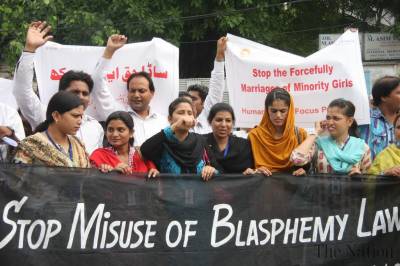
Another mob lynching incident has taken place in Pakistan, where an innocent Christian man was almost beaten to death on false blasphemy charges, and several houses and shops were ransacked by the mob. The incident occurred in Sargodha, Punjab, a hotbed for hardcore politico-religious groups like Tehreek-i-LabbaikPakistan (TLP), a Sunni-Barelvi organization. As is common in blasphemy incidents in Pakistan, violence erupted against members of the Christian community when some residents of Mujahid Colony in Sargodha found alleged burned pages of the Quran near the houses of a Christian family. Local TLP activists immediately reacted, accusing a 74-year-old man from the minority community and his sons of burning the pages of the holy book. However, reports indicate that a local TLP activist had an altercation with the family members of the Christian man days before the incident. Therefore, many analysts suggest that, like other blasphemy incidents in Pakistan, the Sargodha episode was also a case of a majority community revenge attack against a marginalized religious minority.
Violent attacks against ethnic and religious minorities in Pakistan have seen an upward trend under General Syed Asim Munir’s term as the Chief of Army Staff (COAS). Munir, reportedly a Hafiz-e-Quran and religiously conservative, has ignored the activities of radical groups like TLP, using them for political engineering against certain parties. Consequently, incidents like Sargodha continue unabated, as security agencies are entirely compromised, and the political leadership lacks power to act against Islamist organizations. Punjab is the epicenter of blasphemy-related incidents in Pakistan. In 2011, former governor of Punjab, Salman Taseer, was assassinated for his opposition to the country’s blasphemy laws. Mumtaz Qadri, Taseer’s bodyguard, became an overnight hero for Islamist groups, with thousands of hardline activists protesting in support of him.
In another famous blasphemy case in Pakistan, Asia Bibi, a Christian woman, spent more than eight years on death row over a false blasphemy allegation before finally being acquitted by the Supreme Court of Pakistan (SCP) in 2019. TLP and other Islamist groups responded to her acquittal with violent street protests. On August 16, 2023, anti-Christian violence over unproven blasphemy allegations erupted in Jaranwala, Punjab, when a large crowd associated with TLP unleashed chaos and violence. Within a few hours, the violent mob had vandalized and burned down 19 churches and dozens of Christian homes in Jaranwala, while security forces looked on. Scores of Christian families fled their homes to save their lives. The violence was again sparked by unconfirmed accusations of blasphemy, triggered by the discovery of desecrated Quran pages near the home of two Christian brothers.
Analysts believe that the anti-Christian attacks in Jaranwala and Sargodha are not just a reminder of the impunity enjoyed by politico-religious groups like TLP, but also indicative of a more insidious trend among Pakistan’s urban underclass. In December 2021, the TLP instigated a crowd to lynch Priyantha Kumara, a Sri Lankan factory manager in Sialkot, over false blasphemy charges, leading to massive embarrassment for Pakistan amidst condemnations from foreign governments and human rights organizations. Since 1990, at least 85 people have reportedly been killed in Pakistan over claims of blasphemy. Interestingly, between 1927 and 1986, only 14 incidents of blasphemy were reported in what is now Pakistan. However, violence against non-Muslims in Pakistan escalated rapidly after former COAS General Zia-ul-Haq made blasphemy punishable by death.
Reports suggest that more than 2,100 people have been accused of blasphemy in Pakistan since 1987, with 40 currently on death row and at least 89 killed by mobs over blasphemy accusations.Subsequent army chiefs in Pakistan, after General Zia, have refrained from altering the blasphemy laws, instead using them to marginalize minorities and exert pressure on local political parties. Sections 295-A, B, and C of Pakistan’s Penal Code, which deal with blasphemy offenses, do not require proof of blasphemous intent.TLP and other Islamist groups exploit the linguistic ambiguity in these legal sections to target religious minorities and members of the Ahmadiyya community with false blasphemy charges.Additionally, these groups are now increasingly using social media to amplify blasphemy accusations against minorities in Pakistan. Incidents like those in Sargodha and Jaranwala instill fear in religious minorities, making it difficult for them to lead a normal life in Pakistan.
The weaponization of blasphemy laws is now out of control in Pakistan, with fringe groups like TLP receiving support from the country’s military establishment to leverage them for political purposes. This institutional support has fueled religious extremism in Pakistan with no end in sight. Famous political figures like former Prime Minister Imran Khan openly supported the blasphemy law and in 2021 called for the Muslim-majority countries to unite in lobbying Western governments to criminalize insults against the Prophet. In January 2023, Pakistan’s National Assembly unanimously passed an amendment to the blasphemy law, expanding punishable offenses and imposing harsher penalties for blasphemy. As of December 2023, the United States Commission on International Religious Freedom’s (USCIRF) database noted that 56 individuals were in Pakistani custody, 48 of whom were detained under blasphemy charges. Similar or even greater numbers of blasphemy cases are expected this year, as state authorities in Pakistan are either ignoring or feeling powerless against Islamist groups like TLP. Consequently, religious minorities in Pakistan—such as Hindus, Christians, and Sikhs—are likely to face increased targeted violence and mob lynching incidents in the coming months.






